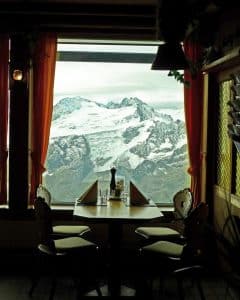A new book on rail travel across the continent showcases gorgeous scenery, historic routes and adventures at a slower pace.

Railways in Europe are many things. With their grand stations, history and evocative destinations, they evoke a timelessness that is absent from the uniform experience of flying. In recent decades, high-speed services have complemented classic routes, while the demand for more climate-friendly travel has grown and new options have sprung up, including a recent wave of night trains.
Lonely Planet, which for nearly 50 years has championed a down-to-earth, connected style of travel, has produced a new Guide to Train Travel in Europe aimed at unlocking adventures by rail from any starting point on the continent. Here the authors pick fantastic journeys from the book.
Paris to Berlin – fast or slow
A well-established network of high-speed trains and a huge choice of slower options connects two of Europe’s great cities. A glorious three-country tour would allow you to head from Paris to Brussels, travelling on to Cologne via the space-age architecture of Liège-Guillemins station.
Cologne’s cathedral is so close to the station you can hardly miss popping in before boarding an onward ICE German fast service to the capital, which takes less than five hours. To see more than the immediate surroundings of the station buildings in each city, book separate tickets for each leg at trainline.com, or add in a stop of a few hours or an overnight booking via Deutsche Bahn (bahn.de). A high-speed connection from Paris via Frankfurt is also possible.
Amsterdam to Vienna on the Nightjet
One of several recent additions to Europe’s sleeper train scene, the Nightjet service operated by Austrian Railways (oebb.at) departs every evening at 7pm or 7.30pm from Amsterdam. As you doze off, the train will trundle alongside the Rhine, passing Cologne and Koblenz, then continuing south-east through Germany and entering Austria at Passau. A 9.19am arrival in Vienna ensures time for a lie-in and breakfast.
This train can easily be combined with the Eurostar service from London or a ferry from Newcastle to Amsterdam, or from Harwich to Hoek van Holland.
Loop the loop in North Wales
Some of the world’s most beautiful narrow-gauge railways can be found in Wales and two of the best can be combined in a loop that takes in the mountains and coastal scenery of Snowdonia.
Catch a service from Llandudno Junction – which has main line connections – down the Conwy valley to Blaenau Ffestiniog. Change for the celebrated Ffestiniog Railway, a distinctive steam-hauled service that winds 13 miles down to the coast at Porthmadog. Return via the sublime steam service of the Welsh Highland Railway under the summit of Snowdon to Caernarfon, where you can catch a bus to Bangor and main line services.
From Bastia to Ajaccio through the Corsican interior
The Chemins de Fer de la Corse (Corsican Railways) is a narrow-gauge railway centred on Ponte Leccia – from where three main lines head to Ajaccio, Bastia and Calvi, all providing incredible views of beautiful and rugged terrain. The route linking Ajaccio and Bastia is the longest and most celebrated, taking three and a half hours, so is best done with an overnight stop, rather than attempted as a day trip. Corsica is well served by ferries from mainland France such as Toulon, Marseille and Nice, opening up a tempting train-and-ferry route from the UK.
Dublin to Madrid by train and ferry
It is possible to head from Dublin direct to mainland Europe. A largely single-track line skirts the Irish Sea heading south as far as Wicklow before veering inland and stopping in the appealing county town of Wexford, set on the estuary of the River Slaney. It’s a short hop along the tracks from there to the port of Rosslare for the twice-weekly ferries to Bilbao, which take about 30 hours. Then it’s a five-hour rail journey on to Madrid. Recommended stops take in Burgos’s treasured cathedral, the former Spanish capital of Valladolid and Segovia’s Roman aqueduct and Alcázar fortress.
Venice to Palermo – across the water in Italy
Heading from top to toe in Italy, this dramatic journey’s potential stopping points need no introduction. Fast Frecciarossa trains connect Venice to the gastronomic centre of Bologna in 90 minutes, with Florence 40 minutes down the line. An hour and a half further on you’re in Rome. From here the south of Italy opens up. For one of Europe’s most unusual rail experiences take a train service all the way to Sicily. At Villa San Giovanni in Calabria, you and your carriage board a dedicated ferry to Messina, in Sicily, from where the hectic fun of Palermo is a slow-rolling four and a half hours’ ride away along the coast. There are several daily intercity and night services that run from the mainland, via the ferry, through to the Sicilian capital including sleepers direct from Milan, Genoa and Pisa.
From coast to coast, via a mountain high – Oslo to Bergen
A contender for Europe’s best train trip, the Bergen Line (Bergensbanen) thunders past southern Norway’s mountains and lakes between Oslo and Bergen, reaching 1,222m at Finse station, where a snowball fight is generally on offer. The trip takes nearly seven hours, which passes quickly in a blur of incredible scenery on a comfortable intercity service. There’s scope to do a longer version of this route taking the Norway in a Nutshell tour, which includes the Flåm Railway – possibly the world’s most scenic branch line – and a boat journey through Nærøyfjord and Aurlandsfjord.
Paris to Barcelona on the slow train
These cities are linked by a fast train, but there’s a leisurely route south through France to the Pyrenees via Limoges, Toulouse and through magnificent rural and mountain scenery to Latour-de-Carol. While it’s possible to reach Latour-de-Carol by direct night train from Paris, you would miss the slowly unfolding views you can enjoy when doing this journey in daylight. From Latour-de-Carol a commuter line runs all the way to Barcelona and takes just over three hours. Possible stops along the way include fortified Ribes de Freser and Ripoll, home to an ancient monastery and a good starting point for hiking trails.
Budapest to Split on a sleeper
During the summer there’s a tempting night service between Hungary’s capital and the Adriatic. In recent years the train has left Budapest at midnight, getting into Split after lunch. En route it passes the Hungarian holiday playground of Lake Balaton and Zagreb, Croatia’s capital. Once on the Adriatic coast, buses head south to Dubrovnik, while ferries and catamarans radiate out to nearby islands.
Locarno to Domodossola through the Swiss Alps (pictured above)
Pretty much any journey in Switzerland promises jaw-dropping scenery, and on several routes trains run slowly specifically to show off the mountains, rivers and lakes that can be seen from the window. Travelling between Locarno in Switzerland to Domodossola in the Piedmont region of Italy, the Centovalli (Hundred Valleys) Railway is a short but scenic service past 52km of waterfalls, chestnut groves, church-topped villages, deep ravines and vineyards. Highlights include the Isorno Bridge near the village of Intragna and Intragna’s gorge.
These routes, plus tips on rail travel, are featured in Lonely Planet’s Guide to Train Travel in Europe by Tom Hall, Imogen Hall and Oliver Smith (£19.99), available at shop.lonelyplanet.com
(Article source: The Guardian)

